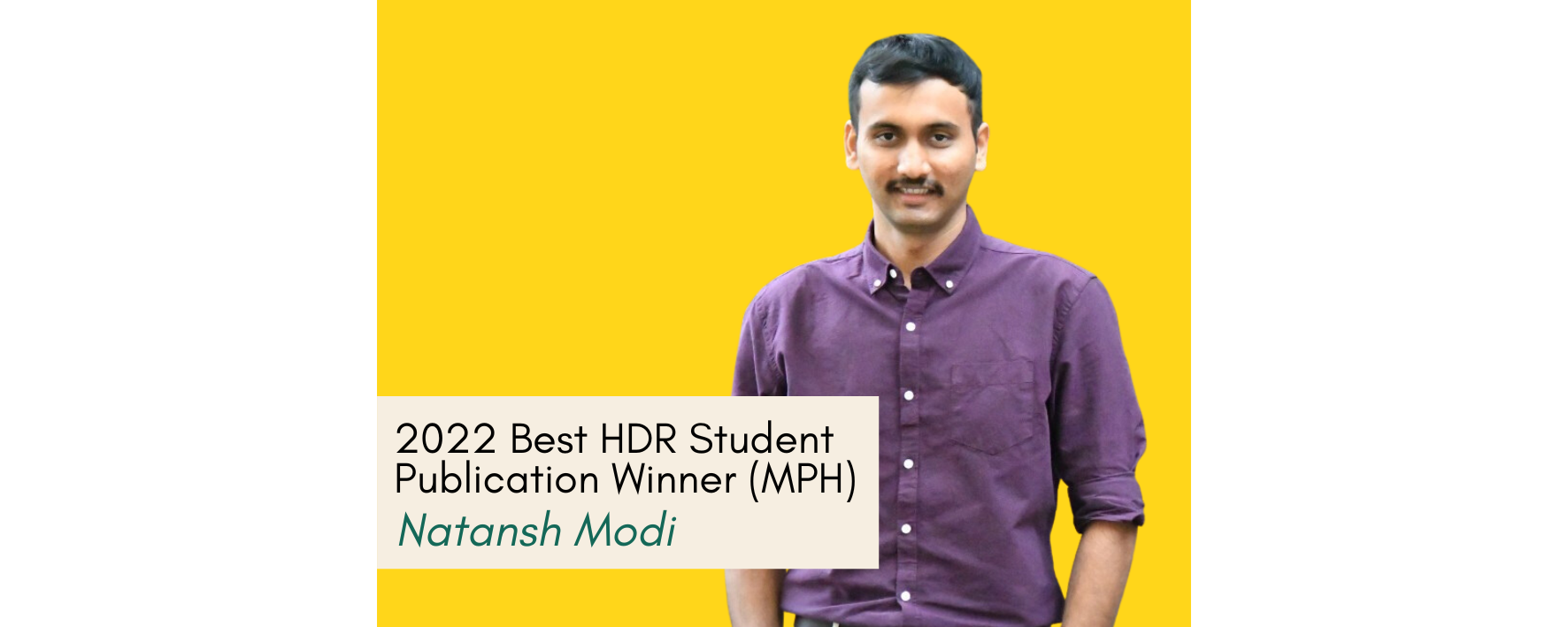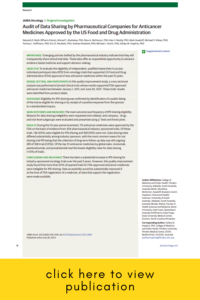
Natansh Modi is from the College of Medicine and Public Health and is one of the eight winners of the Best HDR Student Publication Award for 2022. Natansh is supervised by Dr Ashley Hopkins, Professor Ross McKinnon, Associate Professor Andrew Rowland and Professor Michael Sorich. 
The winning publication “Audit of Data Sharing by Pharmaceutical Companies for Anticancer Medicines Approved by the US Food and Drug Administration ” explores the eligibility of independent, qualified researchers to access individual participant data (IPD) from oncology trials that supported US Food and Drug Administration (FDA) approval of new anticancer medicines within the past 10 years.
We invited Natansh to share their insights into the PhD journey and what winning this award means.
Tell us about your PhD journey so far.
My PhD journey so far has been challenging but rewarding. I have learnt various precision medicine techniques, such as pharmacometrics, individual participant data level analysis, and machine learning, to analyze and interpret complex clinical trial data. I have also been studying the transparency policies of pharmaceutical companies, such as individual participant data sharing, clinical study report publication and redaction practices. I have been leveraging big data from clinical trials to make prediction models and perform hypothesis-generating novel analysis. My research aims to identify clinicopathological characteristics that will drive the use of precision medicine in cancer. I have enjoyed working and collaborating with other researchers and clinicians.
The significance of my JAMA Oncology publication is that it reveals the current state of data sharing by pharmaceutical companies for anticancer medicines and identifies the barriers and opportunities for improving transparency and advancing evidence-based medicine. In addition to this project, I have also worked on developing a prediction model that identifies the risk factors and provides personalized toxicity risks for patients initiating abemaciclib therapy, which will help clinicians to monitor and manage these adverse events more effectively. Furthermore, I have also explored the importance of patient voices in cancer treatment – Patient-reported physical well-being provides independent information to clinician-driven performance status for predicting survival and toxicity outcomes.
I am looking forward to completing my PhD and making a positive impact on the field of precision medicine and cancer research.
![]()
What does winning this award mean to you?
Winning the award is a clear recognition of my hard work and dedication to my field of study. It also motivates me to continue pursuing excellence and innovation in my research.
![]()
What is your research about in 1-2 sentences?
Machine learning and big-data are dramatically advancing human predictive capacities across multiple facets of society, business, and healthcare. However, these capacities are often limited by the lack of access to high-quality data from clinical trials, especially in the field of oncology. My research aims to establish and leverage collaborations with major pharmaceutical companies and promote data transparency practices that enable the sharing and integration of high-quality data from contemporary breast cancer trials. By doing so, I hope to deliver actionable prediction strategies and breakthroughs that improve the lives of patients with breast cancer through precision medicine.
![]()
Why did you choose to commence a PhD?
I chose to commence a PhD because I have a passion for research and innovation in the medical field. I want to contribute to the advancement of precision medicine, which is the tailoring of medical treatments to the individual characteristics of each patient. I believe that precision medicine has the potential to improve the quality of life and health outcomes for millions of people around the world. One of the challenges of precision medicine is to access and analyse large amounts of data from various sources, such as clinical trial and real world data. I think that leveraging transparency policies of pharmaceutical companies can help overcome this challenge, by allowing researchers to access and use data from clinical trials and drug development processes. By doing so, I hope to discover new insights and opportunities for improving precision medicine and address unmet medical needs.
![]()
What advice would you give to current or prospective PhD students?
An advice that I would give to current or prospective PhD students is to communicate well with your supervisor. Communication is key to establishing a good relationship with your supervisor and getting feedback and guidance on your research.
![]()
How did you choose your supervisor?
I chose my supervisor based on his expertise and reputation in the field of clinical epidemiology and precision medicine. He has led many studies on the effectiveness and safety of different cancer medications for various cancer subtypes. His research is also focused on precision medicine, which is the application of clinicopathological characteristics to stratify patients and optimize their treatments. I admire his work and I believed that he will be able to provide me with valuable guidance and feedback on my research project.
![]()
Publication Details:
Audit of Data Sharing by Pharmaceutical Companies for Anticancer Medicines Approved by the US Food and Drug Administration
Natansh D. Modi; Ahmad Y. Abuhelwa; Ross A. McKinnon; Alan V. Boddy; Mark Haseloff; Michael D. Wiese; Tammy C. Hoffmann; Eric D. Perakslis; Andrew Rowland; Michael J. Sorich; Ashley M. Hopkins
JAMA Oncology
DOI: 10.1001/jamaoncol.2022.2867
https://jamanetwork.com/journals/jamaoncology/fullarticle/2794806

